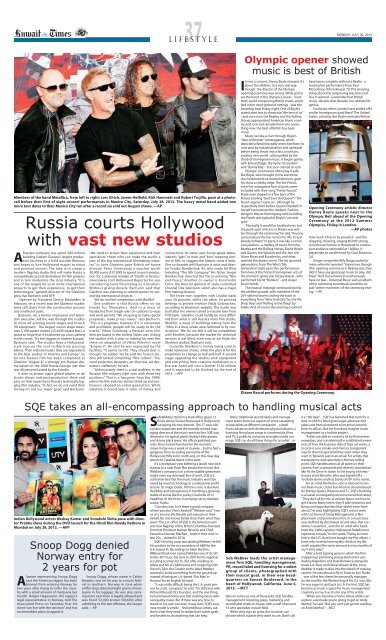UAE widENS cRAckdOwN; MORE ISlAMiStS ... - Kuwait Times
UAE widENS cRAckdOwN; MORE ISlAMiStS ... - Kuwait Times
UAE widENS cRAckdOwN; MORE ISlAMiStS ... - Kuwait Times
Create successful ePaper yourself
Turn your PDF publications into a flip-book with our unique Google optimized e-Paper software.
Indian Bollywood actors Akshay Kumar and Sonakshi Sinha pose with director<br />
Prabhu Deva during the DVD launch for the Hindi film Rowdy Rathore in<br />
Mumbai on July 28, 2012. —AFP<br />
A lawyer<br />
Snoop Dogg denied<br />
Norway entry for<br />
2 years for pot<br />
representing Snoop Dogg<br />
says the American rapper has been<br />
banned from entering Norway for<br />
two years after trying to enter the country<br />
with a small amount of marijuana last<br />
month. Holger Hagesaeter, the rapper’s<br />
legal representative in Norway, told The<br />
Associated Press on Saturday that his<br />
client “can live with the decision” and has<br />
no immediate plans to appeal it.<br />
Snoop Dogg, whose name is Calvin<br />
Broadus, was on his way to a music festival<br />
in southern Norway in June when<br />
sniffer dogs detected eight grams of marijuana<br />
in his luggage. He was also carrying<br />
more cash than is legally allowed and<br />
was fined 52,000 kroner ($8,600) after<br />
admitting to the two offenses, the lawyer<br />
said. —AP<br />
37 LIFESTYLE<br />
Members of the band Metallica, from left to right; Lars Ulrich, James Hetfield, Kirk Hammett and Robert Trujillo, pose at a photocall<br />
before their first of eight concert performances in Mexico City, Saturday, July 28, 2012. The heavy metal band added two<br />
more tour dates to their Mexico City run after a record six sold out August shows. —AP<br />
A Russian<br />
Russia courts Hollywood<br />
with vast new studios<br />
company has spent $89 million<br />
building Eastern Europe’s largest production<br />
facilities in a field outside Moscow<br />
and hopes to lure Hollywood majors to shoot<br />
and produce movies. The idea is to create a<br />
modern flagship studio that will make Russia a<br />
competitively priced destination for film projects<br />
and in turn modernize the local industry. “It is<br />
one of the targets for us to invite international<br />
projects to get their experience, to get their<br />
technologies,” general-director of the Glavkino<br />
grou, Ilya Bachurin, told AFP.<br />
Opened by President Dmitry Medvedev in<br />
February, on a recent tour the Glavkino studios<br />
were still dusty from the construction process<br />
and smelled of paint.<br />
Bachurin, 42, a former impresario and television<br />
executive, led the way through the studios<br />
to show off echoing sound stages and hi-tech<br />
3D equipment. The largest sound stage measures<br />
3,108 square metres (33,4340 square feet), a<br />
space so large that it swallowed up a bus parked<br />
in the corner. “It’s the biggest in eastern Europe,”<br />
Bachurin said. The studios have a Hollywoodstyle<br />
sign on the roof visible from passing<br />
planes. Their website boasts they are “equivalent<br />
to the best studios of America and Europe”. So<br />
far one feature film has been completed at<br />
Glavkino: “August 8,” a strongly pro-Russian drama<br />
based on the 2008 Russia-Georgia war that<br />
was 90 percent funded by the Kremlin.<br />
It aims to attract major global players to do<br />
studio shoots and post-production there and<br />
pass on their expertise to Russia’s technically lagging<br />
film industry. “In fact we do not need their<br />
money-it’s not our major goal,” said Bachurin.<br />
“We need to attract their experience and their<br />
specialists: those who can make the studio a<br />
part of the big international filmmaking industry.”<br />
In June Glavkino gave British art-house<br />
director Peter Greenaway a voucher worth<br />
30,000 euros ($37,000) to spend on post-production<br />
for a planned remake of “Death in Venice.”<br />
Greenaway told Hollywood Reporter he was<br />
considering Saint Petersburg as a location.<br />
Without giving details, Bachurin said that<br />
Glavkino was planning to submit quotes for several<br />
big international projects.<br />
‘We do not feel competition with Mosfilm’<br />
One problem is that Russia offers no tax<br />
breaks for filmmakers. Add in a mass of<br />
headaches from tough rules on customs to visas<br />
and work permits. “We are going to make special<br />
proposals, make prices lower,” said Bachurin.<br />
“This is a pragmatic business. If it is convenient<br />
and profitable, people will be ready to do the<br />
maths.” Viktor Ginzburg, a Russian-born film<br />
director based in the United States was visiting<br />
the studios with a view to making his next film<br />
there-an adaptation of Viktor Pelevin’s novel<br />
“Empire V”. He said he was impressed by the<br />
facilities. “It seems terrific. They should dust it,<br />
though,” he added. Yet he said the hi-tech studios<br />
still lacked something: “film culture”. “You<br />
need projection designers, art directors, set decorators,<br />
craftsmen,” he said.<br />
“Unfortunately there is a real problem in the<br />
Russian film industry right now with these key<br />
positions.” That is a hangover from the 1990s<br />
when the film industry almost dried up and professions<br />
skipped an entire generation. While<br />
Glavkino is brand-new, it reeks of money and<br />
connections. Its name uses Soviet-speak abbreviations:<br />
“glav” or main and “kino” meaning cinema<br />
or film, to suggest the historic roots it lacks.<br />
One co-founder with Bachurin is actor and director<br />
Fyodor Bondarchuk, 45, who made hit films<br />
including “The 9th Company.” His father Sergei<br />
Bondarchuk directed the Oscar-winning “War<br />
and Peace.” Another co-owner is Konstantin<br />
Ernst, the director-general of state-controlled<br />
Channel One television, which also has a major<br />
film-making division.<br />
The three men together with UralSib bank<br />
own 50 percent, while the other 50 percent<br />
belongs to private investor Vitaly Golovachev,<br />
according to Glavkino’s website. The studio was<br />
built after the owners raised a massive loan from<br />
VTB bank. Glavkino could hardly be more different<br />
from what is still Russia’s main film studio,<br />
Mosfilm, a maze of buildings dating from the<br />
1930s in a busy urban area hemmed in by construction.<br />
“We do not feel it will be competition<br />
with Mosfilm, because the market for technical<br />
services is not filled, even now as we finish the<br />
Glavkino studios,” Bachurin said.<br />
Currently Glavkino is mainly being used to<br />
make television shows, while the plan is for the<br />
proportion to change to half-and-half. A second<br />
stage upgrading the studios with equipment<br />
and everything from costume workshops to a<br />
five-star hotel will cost a further $120 million<br />
and is expected to be finished by the end of<br />
2013. —AFP<br />
Seb Webber stood in a stark office space 12<br />
floors above Sunset Boulevard in Hollywood,<br />
surveying his new domain. The 27-year-old<br />
London expatriate and the recently minted managing<br />
director of the music-services firm SQE was<br />
dressed in his typical plastic Buddy Holly glasses<br />
and skinny black jeans. His office’s polished concrete<br />
floors lacked furniture for the moment _<br />
move-in day was a week or so away _ but he had a<br />
gorgeous floor-to-ceiling panorama of the<br />
Hollywood Hills to his north and, on this clear day,<br />
almost to Catalina Island in the west.<br />
It’s a workplace view befitting a lavish new tech<br />
startup or a cash-flush film production house. But<br />
Webber’s company is in a more volatile (pessimists<br />
might even say doomed) line of work. SQE is a<br />
contrarian bet that the music industry won’t be<br />
saved by novel technology or a radical new profit<br />
stream. Its magic bullet, if there is one, is absolute<br />
flexibility and transparency in handling a growing<br />
stable of artists like the punky Coachella 2012<br />
headliner At the Drive-In and pop-savvy dubstep<br />
auteur Rusko.<br />
“Our idea was, ‘Isn’t there a good company<br />
where you don’t feel cheated?’” Webber said. “I see<br />
us as a service. We literally just execute on their<br />
behalf. No one knows better than them what they<br />
want.” The L.A. office of SQE is the American arm<br />
and new flagship of the British Columbia-founded<br />
firm that President Nathan Beswick and Chief<br />
Executive Duncan MacRae _ both in their mid- to<br />
late 20s _ started in 2010.<br />
SQE’s first big coup was landing Webber. He left<br />
his position as the vice president of A&R for the<br />
U.K.-based XL Recordings to helm the firm.<br />
Billboard had even named Webber one of its “30<br />
Under 30” music-biz stars in 2010 for his regional<br />
scouting acumen for XL. But after working on<br />
Adele and M.I.A.’s A&R teams and cosigning Odd<br />
Future’s Tyler, the Creator to the label, Webber<br />
wanted to build something from the ground up<br />
instead of being an L.A.-based “Our Man in<br />
Havana” for an English hit label.<br />
“It was really difficult being the L.A. point person<br />
for a U.K. company,” he said. “I’m still close with<br />
Richard (Russell, XL’s founder), and the one thing<br />
he hammered home was that nothing exists without<br />
quality music. But if there was any time to<br />
stand on my own two feet, it was now.” SQE’s business<br />
model is simple _ find ambitious artists, ask<br />
them what they need to realize their career goals<br />
and be able to do anything that can help.<br />
I t’s<br />
not a concert, Danny Boyle stressed. It’s<br />
about the athletes. In a very real way,<br />
though, the director of the Olympic<br />
opening ceremony was wrong. While sports<br />
are the heart of the Olympics, music - loud,<br />
bold, world-conquering British music, amplified<br />
in the most global of settings - was the<br />
booming beat Friday night. One of Boyle’s<br />
stated aims was to showcase “the best of us”<br />
- and ever since the Beatles and the Rolling<br />
Stones appropriated American blues, country<br />
and rock and remade them into something<br />
new, the best of British has been<br />
music.<br />
Music ran like a river through Boyle’s<br />
“Isles of Wonder” extravaganza, which<br />
depicted a Britain brutally wrenched from its<br />
rural past by industrialization and upheaval<br />
before being thrust into a fast, uncertain,<br />
exciting new world - all propelled by the<br />
throb of homegrown music. It began gently,<br />
with Edward Elgar, the hymn “Jerusalem”<br />
and “Danny Boy” - but soon started to rock.<br />
Olympic ceremonies often play it safe.<br />
But Boyle, who brought in the electronic<br />
duo Underworld as musical directors, gave<br />
his show a cheeky edge. The Sex Pistols,<br />
once the outrageous face of punk, were<br />
included with their song “Pretty Vacant.”<br />
Boyle even slipped in a few bars of the<br />
Pistols’ snarling “God Save the Queen” (“the<br />
fascist regime”) early on - although he<br />
respectfully did it before Queen Elizabeth II<br />
herself had entered the stadium. Fashion<br />
designer Wayne Hemingway said including<br />
the Pistols was typical of Boyle’s “wit and<br />
guts.”<br />
“Normally it would be brushed over, but<br />
the punk spirit which is in Britain was written<br />
through the ceremony,” he said. “Anyone<br />
cynical about this has no lust for life. It’s just<br />
bloody brilliant.” In parts, it was like a Union<br />
Jack jukebox - a medley of tracks from the<br />
Beatles and the Rolling Stones, David Bowie<br />
and Queen, the Specials and the Jam, the<br />
Stone Roses and Eurythmics, and what<br />
seemed like dozens more. The list spanned<br />
generations, from The Who’s “My<br />
Generation” right up to live performances<br />
from two of the hottest homegrown acts of<br />
the moment: grime star Dizzee Rascal - who<br />
performed his hit “Bonkers” - and singer<br />
Emeli Sande.<br />
The musical melange continued during<br />
the athletes parade, with members of the<br />
204 national teams circling the track to<br />
everything from “West End Girls” by the Pet<br />
Shop Boys and “Rolling in the Deep” by<br />
Adele. And of course the evening could not<br />
MONDAY, JULY 30, 2012<br />
Olympic opener showed<br />
music is best of British<br />
Dizzee Rascal performs during the Opening Ceremony.<br />
Many traditional record labels and management<br />
teams farm out aspects of artist-caretaking<br />
to specialists at different companies _ a label<br />
fronts advances and distributes physical albums; a<br />
licensing firm places songs in commercials, films<br />
and TV; a publicity company wrangles media coverage.<br />
SQE can do all these things for an artist _ or<br />
take on as few as one of those jobs. SQE handles<br />
management, licensing, press, marketing and<br />
record label duties in-house, with a staff of around<br />
14 who specialize in each field.<br />
When they sign an artist, the musician can<br />
choose which aspects they want to use. Don’t call<br />
have been complete without a Beatle - a<br />
rousing live performance from Paul<br />
McCartney, still rocking at 70. The amazing<br />
thing about the outpouring was how endless<br />
it seemed - a reminder that British<br />
music, decade after decade, has retained its<br />
genius.<br />
Could any other country have pulled off a<br />
similar homegrown aural feast? The United<br />
States, certainly. But Boyle reminded Britain<br />
Opening Ceremony artistic director<br />
Danny Boyle speaks next to the<br />
Olympic Bell ahead of the Opening<br />
Ceremony at the 2012 Summer<br />
Olympics, Friday in London.<br />
—AP photos<br />
how much it has to be proud of - and the<br />
clapping, cheering, singing 60,000-strong<br />
crowd loved him for it. Broadcast to a television<br />
audience estimated at 1 billion, it<br />
played like an excellent ad for Cool Britannia<br />
2.0.<br />
Singer-songwriter Billy Bragg spoke for<br />
many when he tweeted: “Impressive though<br />
(the opening ceremony) in Beijing was, they<br />
didn’t have any great pop music to play, did<br />
they?” And if you haven’t heard enough,<br />
have no fear - Universal Music said an album<br />
of the ceremony soundtrack would be on<br />
sale “within moments” of the ceremony ending.<br />
—AP<br />
SQE takes an all-encompassing approach to handling musical acts<br />
Seb Webber leads the artist management<br />
firm SQE, handling management,<br />
PR, record label and licensing for a select<br />
group of clients, photographed with<br />
their mascot goat, in their new headquarters<br />
on Sunset Boulevard, in the<br />
heart of Hollywood, California, June 4,<br />
2012. —MCT<br />
it a “360 deal” _ SQE has banished that term for a<br />
deal in which a label gives larger advances but<br />
takes cuts from all streams of an artist’s income<br />
from its offices. But the firm does imagine music<br />
management as a holistic project.<br />
“Artists are able to control a lot by themselves<br />
nowadays, and considering the established awareness<br />
of how the business side of their art works, a<br />
la carte is a no smoke-and-mirrors, transparent<br />
way for them to get what they want when they<br />
want it,” Beswick said in an email. For artists, that<br />
transparency and selectivity is the key selling<br />
point. SQE handles artists at all points in their<br />
careers, from a seasoned and recently reunited act<br />
like At the Drive-In down to the young Irish electronica<br />
artist Mmoths, who was signed off a<br />
YouTube demo and has barely an EP to his name.<br />
For an artist like Rusko, who is beloved in serious<br />
beat-music circles but who has also produced<br />
for Britney Spears, Rihanna and T.I., SQE’s flexibility<br />
is an asset in navigating an unconventional career.<br />
“They do it all for me, or at least figure out how to<br />
get it done. Many times, they’ll take initiatives and<br />
bring cool opportunities that I didn’t even think<br />
about,” he said, highlighting SQE’s recent work<br />
with Cat Stone of Stone Management, a filmplacement<br />
and promotions firm. In a music business<br />
defined by decimated record sales, that creativity<br />
is essential _ even for an artist who headlined<br />
the 3,800-capacity Hollywood Palladium to<br />
rapturous crowds. “In one week, I’ll play to more<br />
kids in the U.S. than have bought my first album. I<br />
have only received one royalty check in my life,<br />
and it equaled the same amount as two months of<br />
my T-shirt sales.”<br />
After a brief signing spree in which the firm<br />
snapped up promising young electronica acts<br />
Audrey Napoleon and Data Romance alongside<br />
locals L.A. Riots and Daniel Ahearn & the Jones,<br />
Webber is ready to dive into the details of making<br />
careers. He was about to fly to Texas to join Rusko<br />
_ one of the few clients he personally manages _<br />
on the road for the Western leg of his U.S. tour. But<br />
he was eager to get back to L.A. For him, SQE has<br />
become as much a space for music-management<br />
creativity as much as it is for any of his artists.<br />
“When you become a home where artists can<br />
explore, eventually you’re going to get an Andy<br />
Warhol,” he said. “But you can’t just go out and buy<br />
an Andy Warhol.” —MCT

















